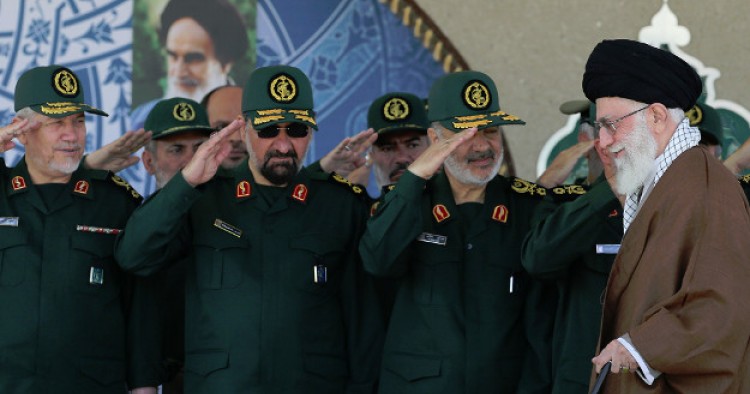A senior Iranian official said that the era of American “hegemony” has ended and called on the U.S. military forces to leave the Middle East region. "Today, the conditions have principally changed and if we look at the situation of different countries, including Syria, Iraq, Yemen, etc., we see that the Americans should go out of our region because their era has ended," emphasized Yadollah Javani, advisor to Supreme Leader Ali Khamenei’s representative at the Islamic Revolution Guards Corps (I.R.G.C.). He further claimed that the U.S. presence in the region was detrimental both for the American people and for the regional countries.
Comments: As tension between Tehran and Washington is escalating, Iranian political and military leaders have increasingly been calling for the withdrawal of the U.S. military forces from the region. Last month, the deputy Chief of Staff of the Iranian Armed Forces blamed the United States for regional instability. “The only way to [restore] peace and tranquility to the region is the departure of the Americans and the renunciation of aggressive and terrorist operations by dependent and reactionary regimes against independent countries," Brigadier General Massoud Jazayeri said.
His remarks were a reaction to the latest comments by U.S. Secretary of State Rex Tillerson, who at a press conference in the Saudi capital of Riyadh had called on President Hassan Rouhani to take practical actions during his second term in office to halt Iran’s ballistic missile program, end support for regional terrorism, and improve human rights conditions for ordinary Iranians.
Similarly in March, Iran's Defense Minister Hossein Dehghan depicted the U.S. naval forces in the Persian Gulf as armed intruders and called on Washington to leave the region. “What are the Americans doing in the Persian Gulf? It is better they leave this region and do not create trouble for the regional countries,” he said in a reaction to statements by U.S. military officials about Iran’s destabilizing role in neighboring Arab countries and harassment of the naval forces of the United States and its allies in the Gulf region. “Is it acceptable that an armed, insane thief breaks into someone’s house and expects the red carpet to be rolled out for him? This is one modern example of the 21st century barbarism,” he added.
And in late April, Iran’s Foreign Minister Javad Zarif defended the I.R.G.C.’s provocative actions in the Persian Gulf. "Breaking: Our Navy operates in — yes, correct — the Persian Gulf, not the Gulf of Mexico. Question is what US Navy doing 7,500 miles from home," he tweeted, after American officials said a U.S. Navy guided-missile destroyer had fired a warning flare to deter an I.R.G.C. vessel approaching it in the Persian Gulf.
To force the United States to withdraw its troops from Afghanistan and Iraq, the I.R.G.C. over the past decade has provided support to the Taliban and Iraqi Shiite militant groups at the expense of regional stability.
The Middle East Institute (MEI) is an independent, non-partisan, non-for-profit, educational organization. It does not engage in advocacy and its scholars’ opinions are their own. MEI welcomes financial donations, but retains sole editorial control over its work and its publications reflect only the authors’ views. For a listing of MEI donors, please click here.













